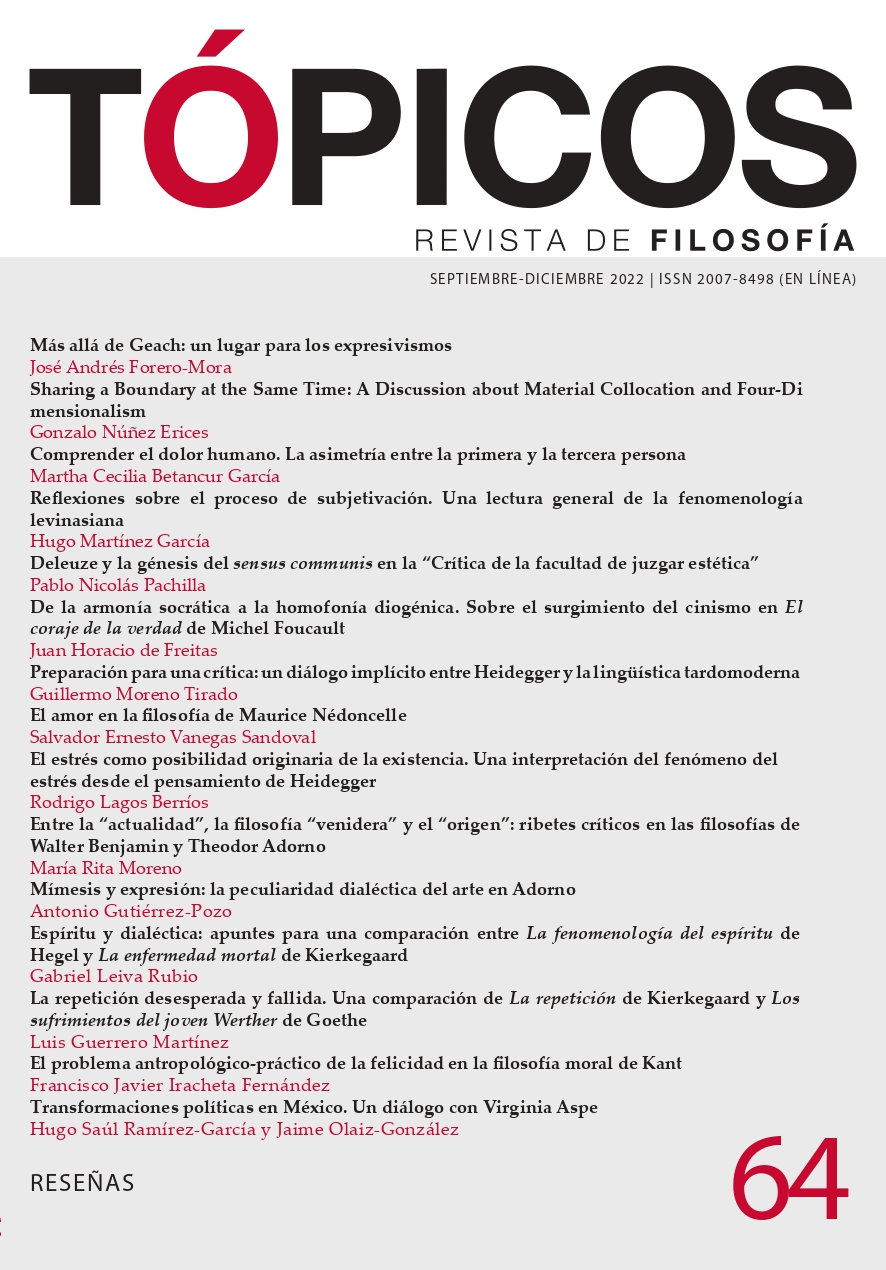Reflections on the Subjectivation Process. A General Analysis of Levinasian Phenomenology
Publicado 2022-08-13
Palavras-chave
- subjetividad,
- corporalidad,
- hipóstasis,
- síntesis,
- intencionalidad
Direitos de Autor (c) 2022 Tópicos, Revista de Filosofía

Este trabalho encontra-se publicado com a Licença Internacional Creative Commons Atribuição-NãoComercial-SemDerivações 4.0.
Como Citar
Resumo
The aim of this paper is to propose a scheme of conscious life that allows us to recognize three constitutive moments of the Levinasian subjectivation process: il y a, jouissance and éthique. Presenting such moments will provide an understanding of subjectivity as a development which is done based on its relationship with transcendence. It will be seen that this term (transcendence) means, firstly, a relationship with sensitive outward experience and, subsequently, a relationship with the Other or an ethics. When describing the different stages indicated, not only the elements of nonobjective processes will be presented—a general reading of Levinasian phenomenology will also be provided by describing different moments that occur within the conscious life and constitute it.
Referências
- Feron, E. (1992). De l’idée de transcendance à la question du langage. L’itinéraire philosophique de Levinas. Jérôme Millon.
- Heidegger, M. (1971). El ser y el tiempo. J. Gaós (trad.). FCE.
- Husserl, E. (2001). Analyses Concerning Passive and Active Synthesis. Lectures on Transcendental Logic. A. Steinbock (trad.). Kluwer Academic.
- Husserl, E. (2002). Lecciones de fenomenología de la conciencia interna del tiempo. A. Serrano de Haro (trad.). Trotta.
- Husserl, E. (2006). Meditaciones cartesianas. M. A. Presas (trad.). Tecnos.
- Husserl, E. (2013). Ideas relativas a una fenomenología pura y una filosofía fenomenológica Libro primero: Introducción general a la fenomenología pura. J. Gaos y A. Zirión (trads.). FCE-UNAM.
- Husserl, E. (2014). Ideas relativas a una fenomenología pura y una filosofía fenomenológica Libro segundo: Investigaciones fenomenológicas sobre la constitución. A. Zirión (trad.). FCE-UNAM.
- Levinas, E. (1971). Totalité et infini. Essai sur l’extériorité. Kluwer academic.
- Levinas, E. (1993). Entre nosotros Ensayos para pensar en otros. J. L. Pardo (trad.). Pre-Textos.
- Levinas, E. (1998). Étique comme philosophie première. Petite Bibliothèque.
- Levinas, E. (2000). De la existencia al existente. P. Peñalver (trad.). Arena.
- Levinas, E. (2001). De Dios que viene a la idea. G. González R. Arnaiz y J. M. Ayuso Diez (trads.). Caparrós.
- Levinas, E. (2002). Totalidad e infinito. Ensayo sobre la exterioridad. D. E. Guillot (trad.). Sígueme.
- Levinas, E. (2003) De otro modo que ser o más allá de la esencia. Antonio Pintor Ramos (trad.). Sígueme.
- Levinas, E. (2004). La teoría fenomenológica de la intuición. T. Checci (trad.). Sígueme.
- Levinas, E. (2005). Descubriendo la existencia con Husserl y Heidegger. M. E. Vázquez (trad.). Síntesis.
- Levinas, E. (2006). Los imprevistos de la historia. T. Checci (trad.). Sígueme.
- Levinas, E. (2016). Totalidad e Infinito. Ensayo sobre la exterioridad. M. García-Baró (trad.). Sígueme.
- Simón Lorda, A. (2001). La experiencia de alteridad en la fenomenología trascendental. Caparrós.
- Malka, S. (2006). Emmanuel Lévinas. La vida y la huella. A. Sucasas (trad.). Trotta.
- Rabinovich, S. (2008). Un lituano en París (en torno a un recorrido transfronterizo de la fenomenología). Acta Poética, 29(2), 461-479.
- San Martín, J. (1990). La sexta meditación cartesiana de Eugen Fink. Revista de Filosofía, 3(4), 247-263.
- Walton, R. (2015). Intencionalidad y horizonticidad. Aula de Humanidades-Universidad de San Buenaventura.
- Murakami, Y. (2002). Lévinas Phénoménologue. Jérôme Millon.
- Zirión, A. y Xolocotzi, A. (2018). ¡A las cosas mismas! Dos ideas sobre la fenomenología, BUAP-Porrúa-Universidad Michoacana de San Nicolás de Hidalgo.





